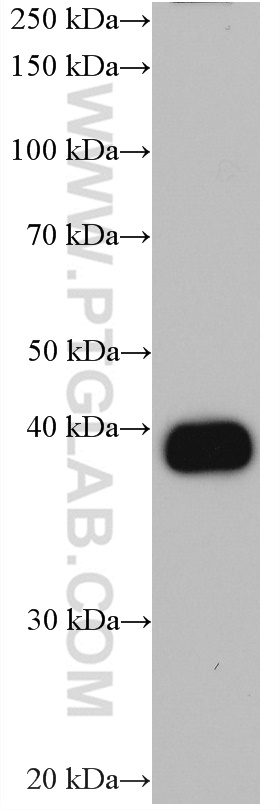验证数据展示
经过测试的应用
| Positive WB detected in | human saliva tissue |
推荐稀释比
| 应用 | 推荐稀释比 |
|---|---|
| Western Blot (WB) | WB : 1:1000-1:5000 |
| It is recommended that this reagent should be titrated in each testing system to obtain optimal results. | |
| Sample-dependent, Check data in validation data gallery. | |
产品信息
66909-1-Ig targets Carbonic Anhydrase 6/CA6 in WB, ELISA applications and shows reactivity with human samples.
| 经测试应用 | WB, ELISA Application Description |
| 经测试反应性 | human |
| 免疫原 | Carbonic Anhydrase 6/CA6 fusion protein Ag24274 种属同源性预测 |
| 宿主/亚型 | Mouse / IgM |
| 抗体类别 | Monoclonal |
| 产品类型 | Antibody |
| 全称 | carbonic anhydrase VI |
| 别名 | CA6, CA-VI, Carbonic anhydrase 6, Carbonate dehydratase VI, CA VI |
| 计算分子量 | 35 kDa |
| 观测分子量 | 38 kDa |
| GenBank蛋白编号 | BC034350 |
| 基因名称 | CA6 |
| Gene ID (NCBI) | 765 |
| RRID | AB_2882236 |
| 偶联类型 | Unconjugated |
| 形式 | Liquid |
| 纯化方式 | Antigen affinity purification |
| UNIPROT ID | P23280 |
| 储存缓冲液 | PBS with 0.02% sodium azide and 50% glycerol , pH 7.3 |
| 储存条件 | Store at -20°C. Stable for one year after shipment. Aliquoting is unnecessary for -20oC storage. |
背景介绍
CA6 (Carbonic anhydrase VI ) is a member of CA family proteins that play a central role in pH regulation and electrolyte balance. CA6 is also known as gustin, is a zinc-containing secreted protein which catalyzes the hydration of carbon hydroxide in saliva. CA6 is specifically expressed in the salivary gland of a number of mammalian species (PMID:28423504). The amino acid sequences are highly conserved across the species. And it was reported that decreasing of CA6 protein was associated with loss of taste and pathological morphology of taste buds (PMID: 9784398).
实验方案
| Product Specific Protocols | |
|---|---|
| WB protocol for Carbonic Anhydrase 6/CA6 antibody 66909-1-Ig | Download protocol |
| Standard Protocols | |
|---|---|
| Click here to view our Standard Protocols |
